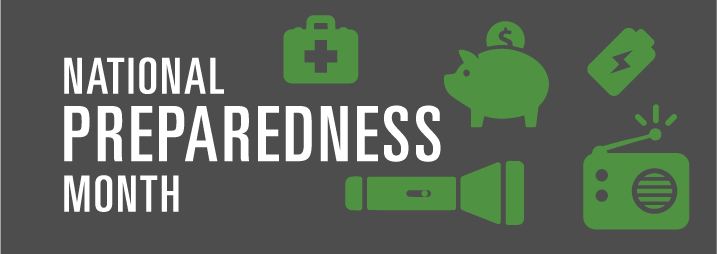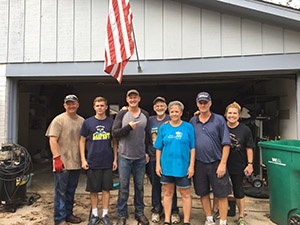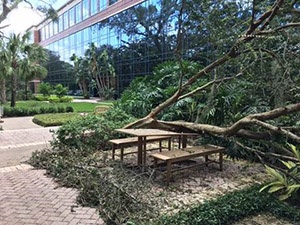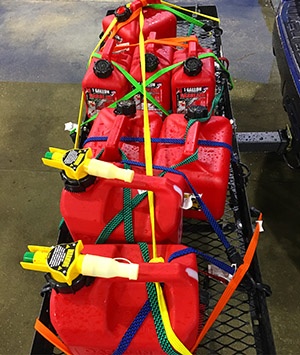
Hurricanes…earthquakes…tornadoes…flood zones…storm surge…winter blizzards. With locations all over the country, Arrowhead offices are susceptible to Mother Nature and her arsenal of weather weapons.
Save this emergency hotline number now to your mobile phone, so that you're prepared for the next office disruption. This hotline will let you know real-time about office closures/openings, etc. in all time zones.
Emergency Hotline Number
877.777.1664
Harvey ushers in 2017 weather disasters
September was Disaster Preparedness month, and ironically was also one of the worst months for disasters in recent Arrowhead history.
|
First it was Hurricane Harvey, chewing up the Gulf Coast along Texas and Louisiana, bringing record-breaking rain (an entire year’s worth) in just a day or two. One of Jackie Miller’s prime producers for the Manufactured Housing Program, Kurt Kelley of Mobile Insurance in Houston, had to close his office because roads were impassable. Luckily none of his staff was injured or sustained major damage, so they could quickly respond to their insureds’ frantic calls. At right: Kurt Kelley, Arrowhead producer, |
 |
Irma followed on Harvey’s coattails
Our ACM office in Tampa was busily handling Hurricane Harvey claims, but had to quickly close up shop when Hurricane Irma struck.
“Ironically, all the forecasts predicted an East coast landfall, so Tampa felt pretty secure. In fact, our hotels filled up with people from the Atlantic side. On Friday, they began to predict a later northward turn, resulting in widespread panic and gas shortages,” recalled Timothy Allen, vice president for ACM’s Property & Casualty division. “I had brought in lunch for the team because people were working hard on Hurricane Harvey claims, but as we watched the news, we decided to close the office early to give folks time to prepare or evacuate.”
|
Saturday in Tampa was frantic, he said: “You could see all your neighbors boarding up, packing vehicles and/or searching for gas or batteries. It felt like an episode of the Walking Dead. Store shelves were cleared of bottled water, sports drinks and bread. And for some reason, peanut butter was completely gone, which I found amusing. But we were spared the worst of the storm.” At right: Tampa office after Irma. |
 |
Nicolle Hardy recounts her Irma escape
“We decided to evacuate when the storm kept shifting west,” said Nicolle Hardy, ACM property claims examiner. They spent two days preparing the house: “I wrapped all my furniture, took pictures off the walls and threw out my entire fridge and freezer contents. I put all my precious belongings in the dishwasher, washer and dryer.”
She called hotels in Georgia, North Carolina, Tennessee and Alabama – all were full. Finally reserving a room in Huntsville, Alabama, they stuffed their escape vehicle completely full and set off on what would normally be a 10-hour drive, but took 26 hours.
|
“In a caravan with friends, we drove through the night. When we needed gas, there was none.” Luckily, a friend told her about the Gas Buddy app, which located gas at a station 80 miles away. “It was a roll of the dice as to whether they’d still have gas when we got there – and they did,” she recalled. “We knew there was a massive gas shortage, so before we returned home, we bought a cargo carrier and intended to fill it with gas cans. But everyone was out of cans.” Calling around, they located cans 180 miles away at an auto parts store. They bought cans of all sizes to hold enough gas for the trip home, which was 27 hours straight. At right: Nicolle's traveling "car bomb" |
 |
Nicolle counts herself as very fortunate: “My apartment only had water damage to the drywall due to a window blowing out in a neighbor’s unit.”
Teresa Heller elaborates preparation tips
The good thing about hurricanes, says Teresa Heller, ACM director of property claims, is that you see them coming and have time to prepare. The bad thing is that the storm seems to approach in slow motion, making the wait agonizingly stressful.
“I’ve worked claims in Florida for 34 years and handled over 45 catastrophes throughout the country,” said Teresa. “I know first-hand the devastation that extreme weather can do to a home, a family, a community.”
Although Teresa moved to Florida in 1980, Hurricane Irma was the first time she evacuated. “I practically live on Tampa Bay; flood risk is our big concern.” They started preparing a week before the storm hit. First on the list: buy 40 gallons of fuel, “because we knew there would be a run on the pumps.” Sure enough, by Thursday stations were running out of gas. Perishables were in short supply. Also gone was plywood to board up windows and generators. Ironically, the storm was still hundreds of miles away and the sun shining.
Storm prep took two-and-a-half days. Here’s what it entailed, Teresa said:
- Board up the windows. “This sounds easy, but it’s not: The boards are heavy, and you’re drilling into your walls and causing damage.”
- Empty the refrigerator. If the power goes out, food will spoil and ruin your fridge.
- Turn off the power. Unexpected power surge can damage electronics.
- Turn off the main water.
- Remove everything from the yard. Otherwise, it becomes flying projectiles.
- Pack up any irreplaceable items. “That meant going into the attic and pulling out the heavy box with all the photos I haven’t yet digitized.”
- Collect all important papers.
- Remove any keepsakes you cannot live without.
- Fill six 5-gallon water jugs to ensure potable water and also for use to flush the toilets if water’s not available or usable after the storm.
Teresa and her husband evacuated to downtown Orlando, to her brother’s 11th floor condo.
The clouds and wind had already started to move in. Then the waiting starts.
“By late Sunday night, the windows in the condo started to flex and groan. Hurricane force winds blew the rain sideways. Water started coming down the walls and saturated the carpet, so we moved furniture and sopped up carpets as best we could. The bad weather lasted about 36 hours; all along you have no idea if you have a home to go back to. And what would this do to our retirement plans?”
They were fortunate, Teresa said. Their home – and retirement plans – are intact. She summed up her experience: “Hurricanes are not fun.”
ACM flooded with hurricane claims
Meanwhile, with both storms, our ACM property claims team has been hopping. “We’ve brought on more than 20 new claims staff and are working with 100+ claims adjusters, for our more than 2,000 claims,” said Dhara Patel, president of ACM’s Property & Casualty division, in mid-September. “We pulled in our non-property teams to help, so that we offered an incredible response: We contacted all affected policyholders within 24 hours of their claim report.”
Dhara’s also been working with ICA to help them recruit a multitude of field adjusters. ICA is another claims service provider that’s part of Brown & Brown’s National Programs. “Where ACM only had a few thousand claims, ICA has had tens of thousands of claims, and they’re desperate for adjusters,” she explained.
Storms of another season: Winter in Sun Prairie
We also checked in with our new Sun Prairie, WI office. While hurricanes aren’t a problem, winter storms can be. We talked with Tiffany Poletti, VP of operations & underwriting initiatives for Core Commercial, about their experiences with winter storms and their snow emergency plan.
“It actually happens very rarely, that the office closes,” she explained. “Most of our employees are spread throughout the country; we only have 18 employees in this office. Many live in smaller, nearby towns and take country roads to work. Those don’t get plowed as fast or as often.”
Sun Prairie staff has laptops and can work from home and access the various systems. “So we leave it up to our employees’ discretion, usually: If you can work from home, you can choose to do so on bad weather days.”
What typically constitutes a “bad weather day”?
“A couple of years ago, we had an 18-inch accumulation in just one day, creating snowdrifts up to four or five feet tall. I couldn’t get out of my house!” she said. “And in 2008, our total snowfall was over a hundred inches.”
Whether it’s hurricanes and flooding along the East and Gulf coasts, tornadoes in the Midwest or earthquakes and fires along the West Coast, it pays to be prepared. You can start by saving our emergency line to your mobile right now.


